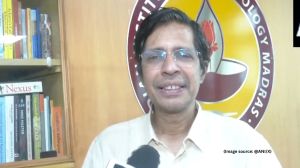‘When I am uncomfortable in the BJP, that will be my last day in politics’
• Brave of you to come out in this weather — all your players have disappeared.The players played in the morning; I think they...

• Brave of you to come out in this weather — all your players have disappeared.
The players played in the morning; I think they’ve gone.
• Few people know about your other avatar — I think this is the only office you still hold, Tennis Association President.
Well, I don’t believe in politics being injected into sports, so I’m here as someone who loves the game, a player of the game — in my earlier avatar.
• Right. But the real game you play is still politics.
The real game is still politics.
• A very different ball-game.
It’s a very different ball-game — there’s hardly any sportsmanship involved.
• Double faults, wrong calls…
No love game, politics.
• Has it happened with you lately? A couple of statements — are those double faults, wrong calls…?
Perhaps, perhaps.
• Served with good intentions?
Yes. I would say that I have no evil intentions. I did not want to create mischief when I said that, and I hope it will have the kind of impact I want it to have. Now that I have been told by the party to raise the issue within the party, I will do so.
• This is also a time when there’s a lot of Emergency nostalgia — the thirtieth anniversary of the Emergency…
The month of June…
• Do you remember something Mrs. Gandhi had said at that time? She had said, we are doing what we are doing, defying the party line, following the voice of conscience, antaratma ki awaaz. In your case, was it also antaratma ki awaaz?
It’s a very dicey thing, because you can justify any wrong on the basis of antaratma ki awaaz. But I would say, yes, I said what I felt at that point of time. Maybe I did wrong because this was not permitted by party discipline. But the simplest explanation of this is — and there is no other explanation — that I felt strongly about it.
• This was antaratma ki awaaz?
It was antaratma ki awaaz.
• I know you don’t like to be reminded of what Mrs. Gandhi said, but that was the neatest excuse for defying the party.
I suppose, Shekhar, in whatever walk of life we are, we all have this antaratma ki awaaz from time to time, and you are compelled to listen to the antaratma ki awaaz. This is one awaaz which perhaps cannot and should not be stilled.
• And it won’t be in your case as well?
Yes, yes.
• Particularly now that you don’t have the constraint of being party spokesman?
Even otherwise. I’d say that I’ll definitely follow the party’s instruction to me to raise these issues within the party, and I hope that I’ll get an opportunity to raise them.
• But Yashwant ji, something surprised us — and I’m going back not to this statement, but the earlier one. You are a lateral entrant within the BJP, you are not from an RSS background, you are one of the new, urbane, modern leaders who came to the BJP. How quickly you criticised Mr. Advani for his Jinnah statement! I would have thought that if he was making an effort to steer the party towards the middle, you would have been happier.
Let me explain what I said. I think some parts of the statement were over-emphasised. If you have seen that statement, you perhaps will recall that I had linked it to the India-Pakistan relationship. It was in that context — the Hurriyat had started their visit to Pakistan while Advani ji was still there. There were some very undesirable statements which came from the Pakistani leadership, from their President, from their Foreign Minister — I am not talking about what the Hurriyat said — and those statements disturbed me. I said perhaps this controversy about whether Jinnah was secular, about whether the ideal of secularism should be learned from Jinnah, was unnecessary, it was avoidable. We should have concentrated more on the matter at hand, namely, what the Pakistani leadership was saying.
• But what was the fundamental difference? I don’t think anybody who studies history would deny that for a long time Jinnah was secular, he was with the Congress and Gandhi.
Yes, quite right. There’s no denying the fact. And there’s also no denying the fact that he made that statement in the Pakistani National Assembly. I have no wish to go into the historical record and justify whether Jinnah was secular or non-secular. But I personally feel that Jinnah’s statements have to be seen in the context of his earlier and later statements — he lived, after all, for one more year after that famous statement — what did he say subsequently? He clearly spoke about Pakistan being an Islamic state. Whether an Islamic state can also be a non-theocratic state is up for debate.
• Right. And you think that just picking that up is over-emphasising it? Since Jinnah went through many phases of evolution, just to pick that one instance distorts history?
Even that one instance could have been picked up and put somewhat differently. All the hullaballoo which was created, about Advani ji giving Jinnah a secular certificate, could have been avoided. I personally felt that it diverted attention from the more important issue of troubling developments within the peace process…
• You think that the hard logic of diplomacy and national interest was overshadowed by the emotion of the moment?
I don’t know. I will not find fault with the intention with which Advani ji said what he said. My only point is that if it been had nuanced differently…
• Now, you’ve been a diplomat. As Foreign Minister, how would you have nuanced it, said the same thing in a nuanced way?
I would have said: This is what your leader said, this is who you should be.
• And would you then have said: This is what your leader said, but if you have chosen not to be this way, ask yourselves what went wrong?
Ask yourselves what the creator of Pakistan wanted.
• So, if you were the speech writer, if you were vetting the speech, you would have made those fine distinctions…
Perhaps.
• Is that Yashwant Sinha the civil servant, the bureaucrat, or is it Yashwant Sinha the politician talking?
No, it is Yashwant Sinha the nationalist, who feels for the country and who would want the BJP to play its historic role in the evolution of this country.
• There are people who would then say that if you object to Jinnah being called secular, how can the BJP call itself secular, how can the BJP run a secular government under a secular Constitution?
If you go back again to Jinnah, some of the expressions that Jinnah used for the Congress party before the creation of Pakistan, are the expressions being used by the so-called secularists against the BJP. Exactly the same language, to the word. So, if the Congress party could call itself secular…
• That’s the problem with this subcontinent’s politics: the words remain the same, but the speakers and the addressees keep changing. Many of us thought that when Mr. Advani made this statement in Pakistan, and in some of the things that he did subsequently, that there was a very conscious effort to move the BJP away from the secular-communal debate, and park it in a more mainstream space. Which means taking it away from this anti-Pakistan, anti-Muslim rhetoric, and, as a consequence, taking it away from the shadow of the RSS. You don’t see that as having been the intention?
It could have been the intention, but it didn’t come out.
• But if it was the intention, would it have been a good one?
I would say that every mainstream party in this country has to appeal to all sections of India’s population. I have no doubt in my mind that we have tried to appeal to the Muslim minority, we have tried to attract Muslims…
• There are many people who may accept a party to the right of centre, but who would never accept a party that doesn’t consider minorities equal citizens.
Absolutely. There is no doubt about that. Everyone is an equal citizen — that is guaranteed by the Constitution, and we abide by the Constitution.
• Right. But there is a belief, borne out by some facts, that not all parties believe this. So if Mr. Advani is trying to move the BJP towards the mainstream, is that a good thing or a bad thing?
I believe that the BJP is already in the mainstream. A party which has been the main coalition partner of an alliance at the Centre for six years…
• But it cannot be if it is controlled ideologically by an unconstitutional centre of power in Nagpur, the RSS. Any time the RSS says something, the BJP goes into a deep funk.
Well, you know, everybody in politics today has some centre of power or other. Having been in the goverment for six years in two important ministries, I can tell you I did not experience those pressures as much as they are made out to be.
• But sometimes you did. Like you had to go and explain…
We had to explain. I mean, yes we have links with them. It is one parivar.
• Tell me some interesting experience dealing with them, when you had to go and ‘explain’, something that might go into your memoirs.
I’ll tell you this: I was part of that BJP team which started discussions with the representatives of the Sangh on economic issues long before we came into power. We had discussions on perhaps all important economic issues, and even during those discussions, on certain issues, though we were not in government, a difference in perception was quite evident. When we came into government, on some issues those differences persisted…
• And on some you went and explained to them…
We were able to carry conviction. Finally, the important thing was that we agreed that these were areas of difference, and we had to live with that.
• Would you give me some example of when there was a misconception and you went and removed it?
We had taken a decision that we would permit foreign direct investment up to 26 per cent in defence-related industries on a case-to-case basis. This created apprehensions. I remember we had a meeting, I personally met them, and I explained how India was acquiring its requirements for defence. The question was whether it should be a hundred per cent imported or manufactured at home with 26 per cent FDI: which would give us more self-reliance? Ultimately, I think I was able to convince them…
• But I believe there were also more interesting questions, like there were doubts about why you were parking your foreign exchange reserves in American treasury bonds.
There were some concerns, some advice..
• What was the apprehension?
The apprehension was that if all our foreign exchange is parked abroad in American treasuries or the securities of other countries, then we would make ourselves hostages in their hands and would not get the kind of return that we could expect on our reserves. I went and explained how the international system worked…
• A good idea would have been to buy National Savings Certificates with the money…
I had to explain that it’s not possible to do that.
• That comes from simplicity. Or ignorance?
Well, I’d say that everyone is not very well informed, and if somebody who is supposed to be well-informed carries a point of this kind, then doubts are raised. And, I feel, it is our duty to see that those doubts are removed.
• Of all the BJP leaders, you are among the two or three who have the strongest interest, and the strongest conviction, in the party moving towards the centre, away from the Hindu-Muslim issue, into issues of economy, of governance. To that extent do you think the Advani statement on Jinnah has diverted the debate?
You know, this debate is an internal debate, and this debate will go on. If there are issues like a five per cent reservation for Muslims in Andhra Pradesh, in government jobs and in educational institutions, then there is a demand for separate reservations for Muslims in our legislature. There is reservation for Muslims in Aligarh Muslim University and a demand for more in similar universities; there are cases like Imrana: this debate will not stop.
• But this statement on Jinnah: has it distracted us from that debate?
The Jinnah debate will go on. But this is a debate which should go on among academics and others. As a political party, I feel, it is not necessary for us to get involved in this debate. We should be concerned with the present and the medium and long-term issues which have arisen from it.
• Which is why you raised the issue in Jharkhand?
In a way you can say that.
• Don’t blush. You raised it, and you raised it with good intentions, I believe.
I raised it with good intentions because I experienced those problems, I did not imagine them. Those are problems which were brought to me by grassroot level workers, when I went to my constituency in Hazaribagh.
• Not just you. When I see the records of the Jharkhand Assembly, I find many members of the ruling party, the BJP, have raised the same issues in the Assembly, so things must be seriously bad.
Yes, I think all of us are raising these issues. We are still very young in government — just two months old. I personally feel this is the time to correct whatever oddities there are, and set ourselves on a proper course, so that we can fulfill peoples’ aspirations.
• But you must have felt really disturbed to do this in public. Were you disturbed about how bad things were, or about the fact that nobody was listening in the party, so it was necessary to take it out in public?
I was in my constituency — I have been there many times in the last couple of months — and, as I said, workers from the panchayat level, workers from the mandal level, district level, they come and meet me and they come to me with problems. And, Shekhar, every politician who interacts with the grassroots knows what kind of problems they bring. They bring problems of corruption at the local level, they bring problems with the police, they bring up problems of development, they bring their personal problems of transfer posting and so on. And you are supposed to respond to those problems. There are many occasions when you speak to local officials to set things right, but that will not make for a systemic change. You get one case settled by speaking to somebody, but the system continues to operate in that manner.
• So the statements you made were with that intention, to bring about systemic solutions?
That was exactly what it was, that I wanted systemic changes in the way the administration is run so that people’s problems could be attended to more expeditiously.
• But you don’t think it amounted to embarassing your party?
Perhaps it did and that’s why I’ve paid the price.
• There are many of your critics, who say Yashwant Sinha is now preparing for departure because the BJP is not in power. I’ll tell you one unkind thing that Narasimha Rao once said to me. I had gone to see him when he was neglected, and I asked: What will you do? He said, Arre bhai, main kahan ja sakta hoon? I am not Yashwant Sinha, ki jo party haare, use chhor ke government mein chala jaaoon. So, there is that impression that maybe you are now preparing for a new innings elsewhere.
I am sorry to hear this, because I’d like to share a secret with you. When I was in the Rajya Sabha with Chandra Shekhar ji, it was Mr. Narasimha Rao who went out of his way to induct me into the Congress party. I deliberately made the choice of joining the BJP and not the Congress party at that time. I would also like to remind you that when I was sitting next to Mr. Advani at a press conference on Nov 13, 1993, the day I joined the BJP, a journalist asked me exactly this question: Which is the next party that you are going to join after the BJP? And I told him that if ever a time came when I was uncomfortable in the BJP, that would be my last day in politics.
• So there is no question of your leaving the BJP?
There is no question.
• Or of your waiting for the BJP to expel you so you can keep your Rajya Sabha seat?
Which are the parties that I have changed? I joined the Janata Party. The Janata Party merged into the Janata Dal, so there was no question of changing parties.
• Then the BJP.
Then the Janata Dal split — a hundred times. So this impression about me…
• Today, there are two unkind things. One that you think the BJP is not going to be in power, so let me look for something in the Congress instead…
Absolutely wrong.
• Second, which I don’t believe, that you are waiting for the party to expel you, so you can keep your Rajya Sabha seat.
Absolutely wrong. These people who are making these remarks forget that when I joined the BJP in 1993, I still had six months in the Rajya Sabha left. And I resigned from the Rajya Sabha — it was the only condition that I insisted upon with Mr. Advani, with Vajpayee ji —I said I will resign.
• So, is it correct now to say that the points you’ve raised, one, you don’t regret having raised them, they were points from the heart; and, second, you will continue to raise them in the party forum?
I have been told to raise them, and whenever these issues arise, I will raise them in the party forum.
• When you raise them in the party forum, you don’t find yourself isolated?
No, there is a debate…
• You don’t find yourself in a minority in a majoritarian party?
No. No, I would say that during this period that I have been with the BJP — and I have been with the BJP with devotion and sincerity — I have been allowed to raise issues that have disturbed me from time to time. So there is no gagging, there is no silencing, nobody is putting you down, it’s a party where I feel there is more democracy than perhaps in any other party.
• You were the Finance Minister who, in times of grave financial crisis, had the dubious distinction of mortgaging India’s gold — there was no choice — and then you pushed through many phases of reform. We all know that there are problems with our political system’s commitment to reforms. Do you have a long-term solution?
I still feel very, very genuinely, that the constituency for economic reforms in this country is weak — it is not merely weak, it is silent. And, therefore, a strong and determined minority…
• How to give it a voice?
I think we all will have to work hard. There should be a political voice in favour of economic reforms, there should be a media voice in favour of reforms…
• Is this a strong and vocal minority…
‘Strong and determined’ is the Marxian phrase.
• A strong and determined minority carrying out reforms?
No, no. A strong and determined minority blocking reforms. I personally feel that the majority of the people in this country are for economic upliftment, and that can come only through reforms.
• But can that happen unless the Congress and the BJP start talking?
We were talking when we were in government, so there’s no reason why we should not be talking. But we can’t talk, in today’s circumstances, because they are completely hemmed in by the Left, and will not even take our help.
• But is that something you are promoting within your own party, the idea of the BJP and the Congress talking more, of bridging this gap?
Look, in the last twelve or thirteen months, most of what this government has done on the economic front is to carry forward the initiatives that we had taken. Similarly on foreign policy. And in the economy — take any of the measures that this government has introduced — they were initiated in our time. The Pension Fund Regulatory Authority — it was a Bill we drafted.
• When it comes up for vote, are you going to push for division?
It depends on whether the Congress wants our support, if the Left opposes it…
• But if the Left pushes for division, will you vote against the government?
That remains to be seen. It has not as yet been discussed in the party.
• So, there is no fundamental difference?
There is no fundamental difference. But will the Congress party seek our help?
Photos


- 01
- 02
- 03
- 04
- 05





























